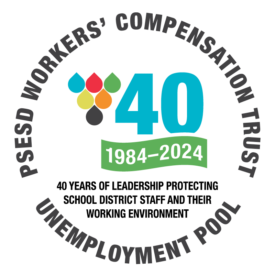The Puget Sound Workers Compensation Trust and Unemployment Pool’s Return-to-Work Managers (RTWM) continue to support our school districts with implementation of return-to-work best practices. Towards that end, we are ushering in an era of additional support through mutual accountability and effective workplace interactions via an appropriately documented interactive process.
What is RTW?
RTWMs educate our Member Districts with effective strategies to retain their valued employees that have been injured on the job, in their job of injury, or in alternate positions. This is implemented by creating a culture based on sustainable and repeatable procedures that adheres to the needs of the employee and the employer. A best-practice return-to-work (RTW) culture provides injured workers, who cannot perform their job of injury, with the opportunity to recover while working in an approved modified/light capacity. Having a RTW culture is fiscally responsible, supports an employment retention strategy, and strengthens staffing stability.
The development of a structured and focused RTW program is anchored by national best practices that create realistic expectations for key participants, and includes the following elements:
- Having Policies or Procedures that staff may refer to in case an on-the-job accident occurs.
- Placing emphasis on the importance of Documentation throughout the interactive process and why.
- Communicating and Coordinating with all participants to ensure the process is shared as the RTW culture is built.
As the RTW culture permeates the organization and programs are set in place, managers and supervisors will be equipped with the tools to promptly place injured workers safely in transitional or alternative work assignments. RTWMs will be offering an in-depth training on September 28th in which we will share our Re-Imagined Return-to-Work Incentive Program.
The Accommodation Process
While an accommodation through alternative work assignment is being considered, efficient and effective communication through various channels must take place to ensure all parties are included in this relationship building process, thus creating an inclusive RTW culture. These parties include the injured worker, employer of injury, and the attending provider. This communication ensures that the needs of the injured worker are met while adhering to the restrictions presented by the attending provider. An employer with a comprehensive RTW culture will confirm that these expectations are met. This RTW approach enables an injured worker to regain their sense of purpose and can be a significant milestone in their physical recovery, and emotional and mental well-being.
Documentation
Documentation of events and activities allow for the opportunity to establish consistent and repeatable practices in the return-to-work process. The Job Offer Letter is the official document that identifies the modified/light capacity job that was agreed upon, the wage for the work offered, pattern of work, and most importantly, the accommodation that was made.
RTWMs encourage a complete interactive process between the employer, attending provider
and injured worker based on written documentation and agreement by all parties. One might say, that if nothing is written, it did not take place. For this very reason, Washington State Department of Labor and Industries and your RTWMs require Job Offer Letters that contain all pertinent information regarding the accommodation. A Job Offer Letter that is not signed does not ensure that the interactive process has taken place, nor does it secure any party to an understanding. Time loss payments stop with the notification from the employer that the worker has returned to work. Without this communication, time loss can conceivably continue until discovered by the Trust.
Resources
8 Keys to Developing a Successful Return-to-Work Program | Employee Benefit News
An Employer’s Duty to Initiate the ‘Interactive Process’ Without a Request for Accommodation From the Employee – McAfee & Taft (mcafeetaft.com)
Fact Sheet: Disability Discrimination | U.S. Equal Employment Opportunity Commission (eeoc.gov)
Help Your Employee Return to Work (wa.gov)
Strategies in Reducing Compensation Costs (dol.gov)



